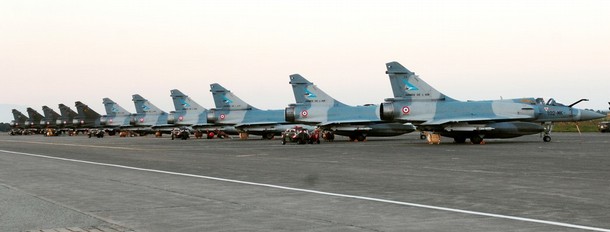
From Ian Traynor and Nicholas Watt, the Guardian: Amid arguments over the scope and command of the air campaign against Tripoli, Turkey both blocked Nato planning on the no-fly zone and insisted that Nato be put in control of it, in order to be granted a veto over its operations, senior Nato officials said.
"Turkey blocked further planning while the coalition [of the willing] continues," said a senior official. Ankara wants the broad coalition involved in the air campaign to cede control to Nato in order to limit its operations, the official added.
The Turks specifically called for a halt to air attacks on ground targets in Libya and signalled that agreement on this would be the price of their assent. …
The Turkish position put Ankara at odds with France, which has successfully thwarted strong US and British pressure to put Nato at the political helm of the air campaign overseeing the UN-decreed no-fly zone over Libya. Paris insisted that the governments of the "coalition of the willing" taking part in the strikes against Gaddafi’s military infrastructure would lead and make the decisions.
"It is important to make clear that the leadership is not Nato," said Alain Juppé, the French foreign minister. "We see this as a UN operation under a UN mandate. It is implemented by a coalition of European, North American and Arab countries. …
Diplomats were optimistic that a deal would eventually be struck giving Nato military planners power to mastermind the operational side of the air campaign, while the strategic and political decision-taking on the aims and direction of the military effort would rest with what Paris called a "contact group" of participating governments. …
Since France carried out the first air strikes against Libya at the weekend, the US has been commanding the operations, in consultation mainly with the French and the British. President Barack Obama has made it repeatedly clear, however, that his interest in taking the lead is very short-term and that the best option would be for Nato to take over – a position strongly supported by [British Prime Minister David] Cameron but opposed by [French President Nicolas] Sarkozy and also, for different reasons, by Germany and Turkey. …
Senior European diplomats argue that there is "no crisis of leadership" yet over the prosecution of the Libyan war effort. But the US impatience to surrender its lead role is exposing big divisions among the Europeans.
While Cameron and Sarkozy are the west’s leading hawks in the war effort against Gaddafi, they are seriously split over who should run things.
A European summit dinner on Thursday tonight in Brussels is to focus on Libya, with the British and French leaders expected to face a grilling from European sceptics, led by Germany, over the strategy, aims, and future course of the military effort. (photo: Getty)
Image: getty%203%2024%2011%20French%20Mirage%202000%20jets.jpg
